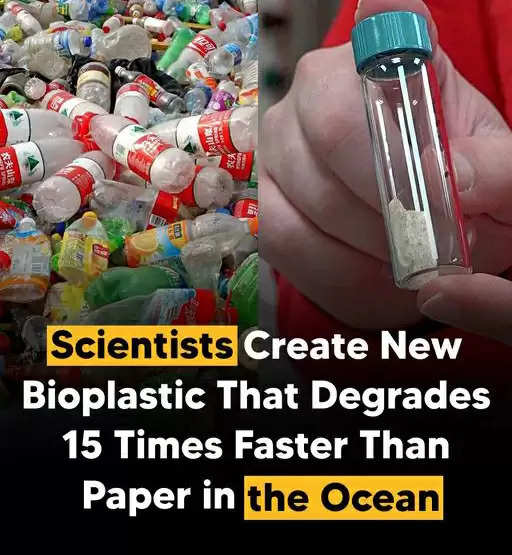Scientists Develop Fast-Degrading Plastics to Combat Ocean Pollution

Scientists at the Woods Hole Oceanographic Institution (WHOI) are making progress on making plastics that break down quickly. This is good news for the seas and the environment because it will help stop the pollution that straws and food wrappers cause. As the amount of plastic trash builds up at an alarming rate, the need for new answers has never been greater.
Cellulose diacetate (CDA), a plant-based polymer that has a lot of potential to break down naturally, is the major player in this project. Normal plastics can take hundreds of years to break down, but CDA is made to break down much more quickly when it gets into the ocean. In fact, scientists discovered that their brand-new type of CDA breaks down 15 times faster in salt water than regular plastics, and even faster than paper!
The results that WHOI got from working with Eastman, a major materials business, are especially good. This new type of CDA lost between 60 and 70% of its mass in just 36 weeks. Polystyrene, which is often used for packaging, barely moved, which shows how important it is to have options in our daily lives.
But that's not the end of the study. After trying foamed versions of CDA, the team found that they worked even better, losing mass 190% faster than the solid forms. This finding opens up exciting new ways to replace materials that don't break down, like Styrofoam. These new ways could be used in packaging, where materials need to be light and effective.
Foamed CDA is already being used by Eastman to make reusable trays, which sets the stage for a long-term shift away from single-use plastics. Soon, these trays might be used instead of non-biodegradable ones, which would be more convenient and better for the earth.

As we learn more about how bad plastic waste is, projects like this are becoming more and more important. Millions of tonnes of plastic trash end up in the seas every year, and it has terrible effects on marine life and ecosystems. Researchers hope to lessen some of that damage by making materials that break down faster.
The work at WHOI is a big step towards solving the bigger problem of plastic trash, and it shows that the way we think about materials has changed. Not only should we use less plastic, but we should also come up with new choices that are good for the environment.
Using recyclable materials like CDA could change the way people buy things and the way packaging is made. Imagine a world where your straw or takeaway container doesn't sit in a dump for hundreds of years, but instead breaks down and goes back into the ground within months.
There is a long way to go, but it is clear that both academics and businesses are committed. We can help make the world a cleaner and healthier place for future generations by pushing the limits of what compostable materials can do. Now is the time to get excited about these changes and support the move towards more environmentally friendly habits in our daily lives!
--
